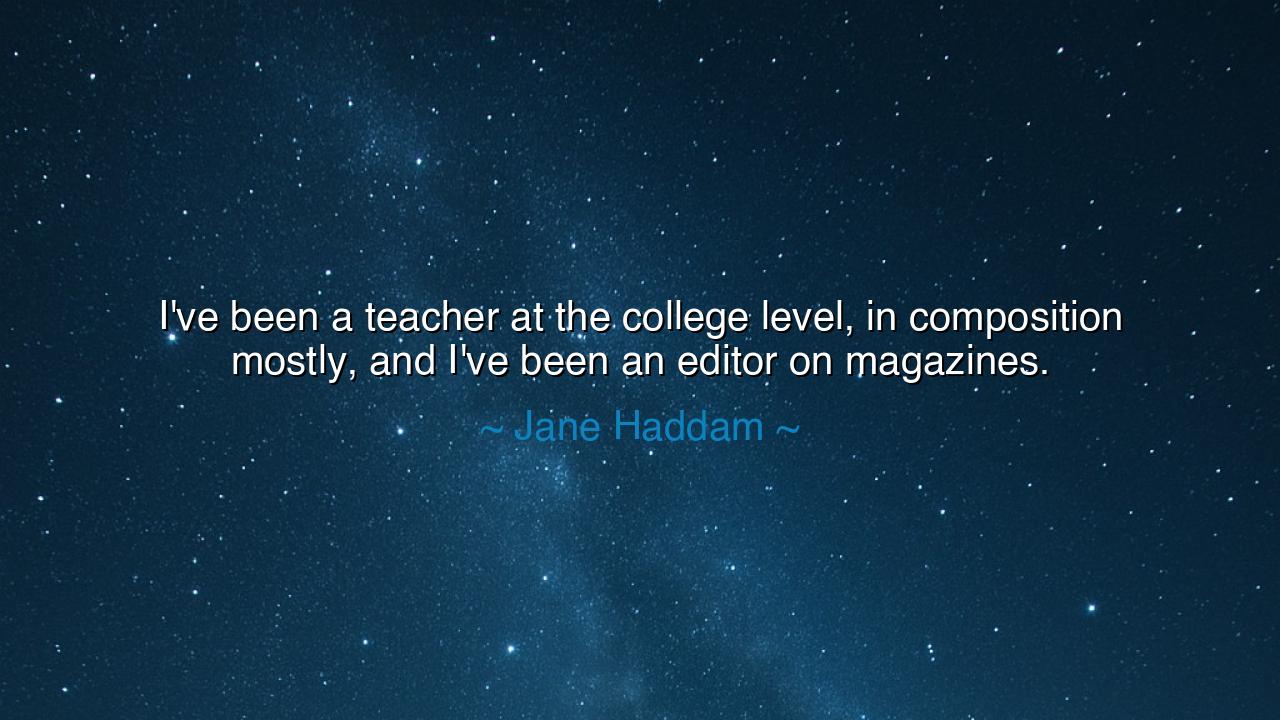
I've been a teacher at the college level, in composition mostly
I've been a teacher at the college level, in composition mostly, and I've been an editor on magazines.






“I’ve been a teacher at the college level, in composition mostly, and I’ve been an editor on magazines.” Thus spoke Jane Haddam, the writer who wove mysteries for the world to ponder. Yet though the words are plain, within them lies a deeper wisdom, a reflection of two sacred callings: the calling to teach, and the calling to shape words until they shine with clarity. In her simple declaration, Haddam revealed the dual path she walked—one of guiding minds, the other of guiding language. Both demand patience, both demand discipline, and both demand the humility to labor not for oneself, but for the growth of others.
To be a teacher of composition is to be entrusted with the souls of the young, those still fumbling to give shape to thought, to carve meaning into the clay of words. The teacher does not merely correct grammar or adjust structure. No—she teaches her students to think, to discover within themselves the power of expression. Like the gardener tending a fragile plant, she prunes here, waters there, and shields the sapling from the harsh wind, that it may one day grow into a mighty tree whose branches give shelter to many. Haddam, in her teaching, was not merely imparting rules of sentences, but opening doors into the vast kingdom of communication, where thought becomes eternal by being shared.
To be an editor, on the other hand, is to stand at the gateway of voices, discerning which shall pass and in what form. The editor is the unseen sculptor, who chips away at rough stone until the statue within emerges. It is not a work of vanity, for the editor does not sign her name in bold upon the finished piece. It is instead a work of service, of self-effacement, where the glory belongs to the writer, but the quiet triumph belongs to the one who polished the words until they glowed. In Haddam’s claim of being an editor, we hear the echo of generations of keepers of language, who ensured that thought was not lost in chaos but delivered with power.
There is an old story of Samuel Johnson, the great lexicographer of England, who labored over his dictionary not for riches but for the love of clarity. He sifted through words as a miner sifts through stone, seeking not gold for himself, but truth for the generations to come. Like Haddam, he too wore the mantle of both teacher and editor, for in shaping language, he taught the nation how to think and speak with precision. Such lives remind us that behind every great text lies one who has suffered the long hours of revision, the endless battle against confusion, the noble work of discipline.
In Haddam’s quote, therefore, is not merely a résumé of past labors, but a testimony of service—to her students, to her readers, and to the craft itself. She embodied the balance between nurturing the unformed voice and refining the formed one. The teacher lifts the apprentice upward, while the editor polishes the craftsman’s product. Together, they form a circle of knowledge and clarity, without which civilization itself would stumble into darkness. For if the young cannot be taught to speak truth, and if words cannot be refined into clarity, then ideas perish in confusion, and wisdom is lost to noise.
The lesson for us is this: let us not scorn the quiet labor of teaching and editing. These are not lesser works, though they lack the glory of fame. They are, in truth, the foundations of culture. Each of us, in our own lives, may take up these roles. When we teach, whether in a classroom or in daily counsel, let us do so with patience, shaping not only the words of others but their confidence. When we edit, whether by revising a colleague’s thought or our own rash speech, let us do so with humility, seeking clarity above ego. For in these small acts, we become builders of civilization.
Therefore, dear listener, take this saying of Jane Haddam as a call to arms—not to the arms of warriors, but to the tools of teachers and editors: the pen, the page, the patient ear, the guiding hand. Teach where you can. what must be refined. And in so doing, you join a lineage of quiet heroes who have kept the flame of knowledge alive through the centuries. To teach is to give light; to edit is to remove the fog. And together, they prepare the world for wisdom yet to come.






AAdministratorAdministrator
Welcome, honored guests. Please leave a comment, we will respond soon